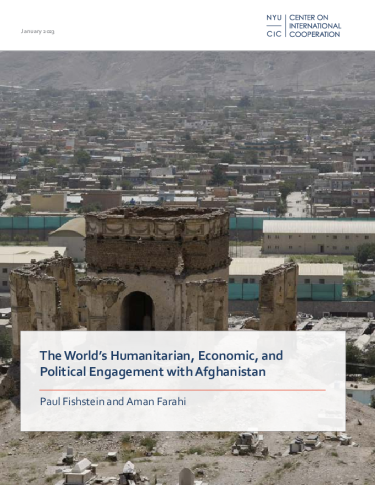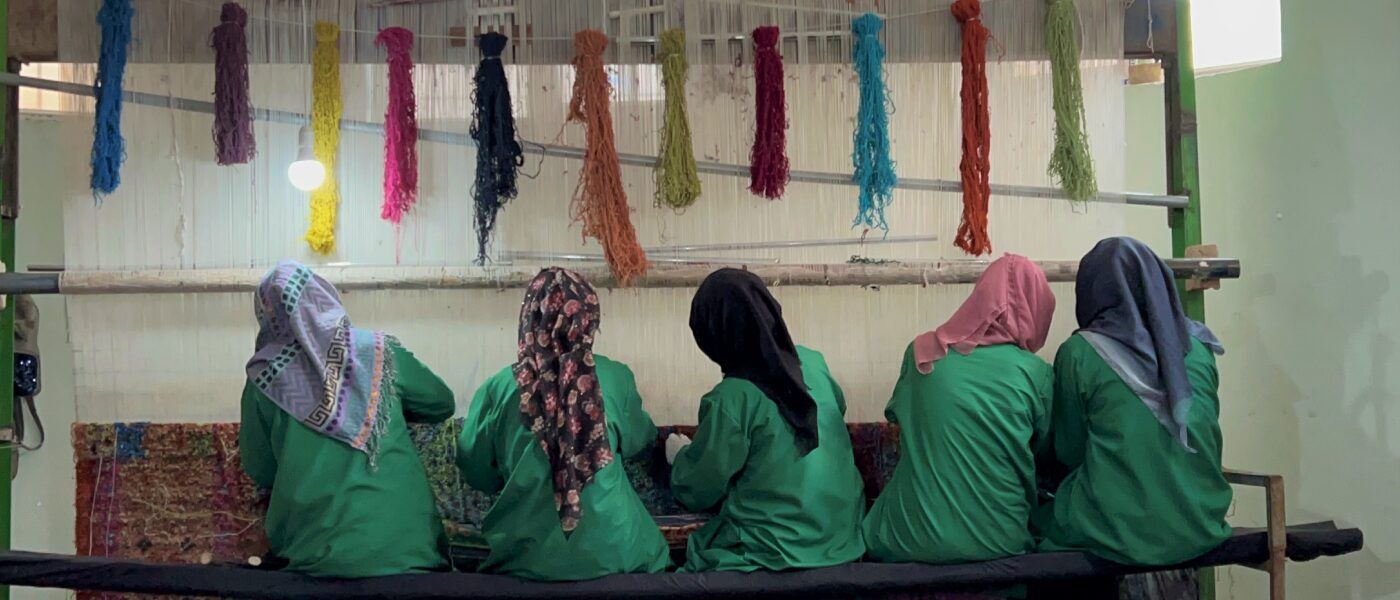Once again, aid agencies in Afghanistan are trying to figure out how to respond to the latest decisions by the Taliban de facto authorities.
On December 20, the Ministry of Higher Education (MOHE) announced that girls and women would be prohibited from attending both private and public universities. Four days later, the Ministry of Economy (MOE) announced that females would no longer be permitted to work for NGOs.
Both edicts have dire consequences, although the prohibition on female non-governmental organization (NGO) workers will have the most immediate ones. Because Afghan cultural traditions, amplified under the Taliban, restrict interaction between men and women, the ban will effectively exclude females from most humanitarian, health, and social services. As one example, one long-time NGO expressed concern that without female outreach workers, they will be unable to identify school-age children—girls and boys—who are at risk of being pushed into child labor–a prospect made more likely by their mothers losing their former employment. In the longer term, the potential severing of incomes of an estimated 150,000 (female and male) staff would deal yet another body blow to already struggling households.
In response to the MOE edict, at least five large humanitarian agencies announced the suspension of operations, citing both these practical concerns as well as core principles of human rights and international humanitarian law. The Agency Coordinating Body for Afghan Relief and Development (ACBAR) announced that many of its 183 national and international NGO members would completely suspend or severely reduce their activities. Suspension of work by NGOs is not primarily a political act; rather, it is a recognition that they are not capable of achieving their mission or ensuring the integrity of their work under the conditions the Taliban are establishing. Agencies’ concerns were reinforced by a statement issued by the Secretary-General of the Organization of Islamic Cooperation (OIC) characterizing the employment ban as both “self-defeating” and “another severe blow” to the fundamental rights of Afghan women.
As is the case with many Taliban pronouncements, it is not clear how the latest edicts will be enforced. While the UN has so far been exempted from the NGO restriction, because virtually all UN-funded services are delivered by NGOs, this is a largely meaningless exemption. The UN’s aid coordinator in Afghanistan, Ramiz Alakbarov, said that meetings with the Ministry of Public Health had produced an exemption for health services, although he didn’t exude confidence about how that “was going to play out.”
The reactions to the MOHE education restrictions from Western embassies, the UN, and others were immediate and harsh. The OIC and prominent academics issued statements that the Taliban’s decision on education was inconsistent with Islam—an observation also made by clerics within the country. The OIC proposed a global campaign to unite Islamic scholars against the de facto authorities’ decision and just this week, at the conclusion of a January 11 “extraordinary meeting,” the OIC’s executive committee issued a broad-ranging communique in which they urged the de facto authorities to reopen schools and universities to girls, while also noting the disruption of humanitarian assistance and other services due to the NGO employment ban. Even Pakistan, the Taliban’s long-time supporter, expressed “disappointment” in the ban and urged that it be “revisited.”
Meanwhile, male university students and professors in Kabul, Kandahar, Nangarhar, and elsewhere demonstrated against the restrictions, many using the slogan “teach everyone or no one.” At the Nangarhar medical college, students refused to take their final exams until women were again allowed to study. In a wrenching spectacle, a tearful Kabul University professor tore up his diploma and other credentials on a live news broadcast, pleading to “keep Afghanistan’s education issue apart from politics, war, and economy.”
The mounting restrictions on education and employment all fly in the face of a string of Taliban promises, made during the 2019-2020 Doha “peace” negotiations as well as more recently in meetings in Kabul and in Oslo, that girls and women could pursue their studies and be able to work.
Once again, the West is left puzzling over what sort of thinking went into such apparently self-harming decisions.
- Is this a hardline negotiation tactic over aid or the country’s frozen assets?
- Is it ideological—another step towards the Taliban’s own idiosyncratic vision of a true Islamic state, insulated from the West?
- Is it part of the internal rifts within the Taliban, representing the escalating tensions between the ultra-conservative Kandahar faction led by Emir Haibatullah and the more pragmatic Kabul one dominated by the Haqqanis?
- Or is it some or all of the above?
Observers generally believe that these decisions are taken by Emir Haibatullah and a small group of associates in Kandahar, primarily to ensure the purity of the movement and, perhaps just as important, to assert his authority vis-à-vis Kabul.
Regardless, these decisions, along with the re-emergence of public floggings and executions, put yet another nail in the already-buried coffin of “Taliban 2.0.” It also quashes the notion that because Taliban leadership have been educated and have lived in Pakistan, UAE, and Qatar (where some of their daughters are said to be attending school), they have a cohesive vision for a modern Afghanistan, or at least one that is less medieval. Whatever their personal cosmopolitanism may be, it clearly hasn’t informed the movement’s decision making, which remains dominated by the conservative Kandahar faction. This is not altogether surprising: the acceptance of such extreme and hardline policies by many of the rank and file in part represents the results of 40 years of training in Pakistani madrassas.
There is currently a flurry of activity in Kabul and elsewhere as the international community (and, it is rumored, some of the more “pragmatic” members of the Taliban) attempts to have the NGO edict withdrawn or amended. Being the clever negotiators and sophists that they are, perhaps the Taliban can manage to do so without losing face.
If the edicts endure, however, aid agencies will face a real dilemma. Until now, Western donors have tried to provide mainly humanitarian assistance following the “help the Afghan people without helping the Taliban” construct, as difficult as that may be, but this may raise serious enough domestic political considerations to make that less feasible. US Secretary of State Antony Blinken threatened “costs” if the edicts were not reversed, and a US State Department spokesperson went so far as to say that the recent policies could be “fatal” to any Taliban hopes to improve their relationship with the West.
However, any further sanctions such as limiting humanitarian assistance or restricting the flow of cash dollars run the risk of exacerbating humanitarian suffering and leaving the West open to accusations of tolerating deepening human misery. Not surprisingly, the Biden Administration, appears to be struggling to balance its policy emphasis between sharp criticism and wary engagement. In fact, with the domestic political costs mounting, the Taliban may be doing the Biden administration a favor by painting themselves as beyond the pale and therefore simply too difficult to deal with.
For their part, German foreign and development ministers announced their intention to suspend aid to Afghanistan, and that the development ministry would request stakeholders in the Afghanistan Reconstruction Trust Fund, which was repurposed after the Taliban takeover to fund NGOs in the provision of services, to consider “whether and how to continue humanitarian efforts in the country.”
These decisions by the Taliban appear to put those in the West who advocate for “engagement” in a bind, but only an apparent one. The issuance of the edicts doesn’t mean that “engagement” should end; it only reinforces the type of engagement that should take place, even, some argue, with the Kandahar clerics.
As new reports emerge of an expansion of the female workplace ban to shopkeepers and of a long-anticipated crackdown on independent media, once again it seems that the Taliban are not doing themselves any favors. Enacting policies so starkly at odds with the world’s view of basic human rights and with the practical needs of vulnerable and suffering households distracts from the Taliban claim that it is Western policies that are harming the Afghan people. It also provides more evidence that as a movement they’re capable of fighting but not governing. As the world grows weary of draconian restrictions that ignore or even exacerbate Afghanistan’s urgent economic problems and the country fades from the West’s policy agenda, the mutually destructive embrace between the West and the de facto authorities bodes poorly for any reduction in human suffering or for any longer-term development under Taliban rule.
Header photo: ILO-supported project benefits women in Mazar. (UN Photo: Tilak Pokharel/UNAMA)




